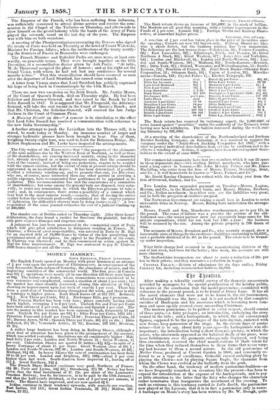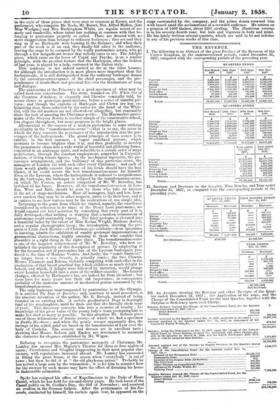aj* itrairts.
After making a tolerably careful survey of the dramatic amusements provided by managers for the special gratification of the holiday public, we arrive at the conclusion that the model pantomime, considered with reference to the present period, is to be found at Drury Lane. It has all the novel elements that were not to be found in the old pantomimes, whereof Grimaldi was the hero ; and it is not marked by that complete sacrifice of Harlequin and his associates which is becoming more com- mon and more openly avowed every succeeding Christmas.
The modern pantomime, to be perfect in every respect, should consist of three parts,-a fairy prologue; an introduction, embodying the story named in the title ; and a harlequinade, in which the old conventional figures, supposed to be the personages of the intreduction, endowed with new forms, keep possession of the stage. In the classic days of panto- mime-that is to say, about forty years ago-the harlequinade with all- important ; the introduction being a short dramatic preface, in which the actors, who afterwards appeared as the habitual drolls of the piece, wore loose habiliments over the garments subsequently displayed, and being thus encumbered, reserved the chief manifestations of their talent for the time when they reduced themselves to those forms that never vary- ing had become to them a second nature. In the old pantomime of Mother Goose, produced at Covent Garden in 1806, and constantly re- ferred to as a type of excellence, Grimaldi maned unfading glory by playing the Clown-not by playing Squire Bugle, the character from whom the Clown was evolved as the butterfly from the grub. On the other hand, the tendency of modern pantomime-builders-as we have frequently remarked on occasions like the present-has been to expand the introduction at the expense of the harlequinade, and to pay so little attention to the latter that the fairy who changes the characters rather terminates than inaugurates the merriment of the evening. To such an extreme is this tendency carried in Lana 2ookh, the pantomime now played at the Lyceum, that it is in fact a pantomime only in name. A burlesque on Moore's story has been written by Mr. W. Brough, quite
in the style of those pieces that were once so common at Easter, and the performers, who comprise Mr. Toole, Mr. Barret, Mrs. Alfred Mellon, (late Miss Woolgar,) and Mrs. Buckingham White, are regular actors of co- medy and vaudeville, whose talent has nothing in common with that be- longing to pantomime properly so called. These are dressed with no more exaggeration than belongs to ordinary burlesque ; they act and they sing as if no Harlequin were looming in the distance; and when their part of the work is at an end, they finally bid adieu to the audience, leaving the stage to be occupied by the really pantomimic actors, who go through a few insignificant scenes that nobody cares to see. The Adelphi piece, which turns on the loves of Cupid and Psyche, is on a similar principle, with the peculiar feature that the Harlequin, after the fashion of last year, is played by a lady, costumed in the Italian style. This tendency is not indeed carried so far at the other houses; for although the introduction is in most places more important than the harlequinade, it is still distinguished from the ordinary burlesque drama by the caricature-extravagance of the chief personages, and the pre- ponderance of dumb-how and practical fun over the fascinations of song and dialogue. The pantomime at the Princess's is a good specimen of what may be called moderate conservatism. The story, founded on The White Cat of the Countess d'Aulnoy, is elegantly and likewise comically told, by actors clever in grotesque gesticulations, before a series of tasteful pic- tures; and though the exploits of Harlequin and Clown are less ex- hilarating than those achieved by the suitor for the hand of the White Cat, still the old maskers are not elbowed out altogether, but reasonably share the task of amusing the Christmas public. The Haymarket panto- mime of the Sleeping Beauty is another sample of the conservative school, less elegant throughout, but more gorgeous in the bright places. All-essential to the success of a modern pantomime is some striking peculiarity in the "transformation-scene "-that is to say, the scene in which the fairy converts the personages of the introduction into the per- sonages of the harlequinade. The grand principle of these scenes is to exhibit, in the first instance, a vague undefined picture, which promises to become brighter than it is, and then gradually to develop the preparatory chaos into a wide world of beautiful and glittering forms, conceived in an arabesque spirit, and reducible to a certain order of stage architecture, through the constant employment, somewhat in Caryatid- fashion, of living female figures. In the mechanical ingenuity, the pic- turesque arrangement, and the brilliancy of this particular scene, the managers of London vie with each other every Christmas ; and each of them would gladly consent that one of his rivals should have the best Clown, if he could secure the best transformation-scene for himself.
Even at the Lyceum, where the harlequinade is reduced to insignificance by the burlesque, the burlesque is eclipsed by the transformation-scene, on which Mr. Fenton, an ardent competitor of Mr. W. Beverley, has lavished all his fancy. However, all the transformation-scenes in Lon- don, West and East, should be seen by those who take an interest in the art of stage-mechanism. Here all managers, high and low, how- ever careless they may be in other respects, strive to do their best, and it is curious to see how various may be the realizations of one simple idea. Returning to the point from which we started, namely, the excellence (considered in reference to its time) of the Drury Lane pantomime, we would expand our brief assertion by remarking that every part of it is fully developed-that nothing is wanting that a modern connoisseur of pantomime could reasonably expect. The fairy prologue is elevated into
a beautiful ballet by the talent of Miss Rosina Wright, Madame Amid,
and a regular choreographic troop; the introduction, showing the pro- gress of Little Jack Horner-of Christmas-pie celebrity-from ignorance to learning, admits the exhibition of sundry grotesque impersonations of grammatical abstractions, highly amusing to those who consider that absurdity is a right thing in the right place. The transformation-scene is one of the happiest achievements of Mr. W. Beverley, who first es- tablished the popularity of this description of picture, by employing it for the decoration not of pantomime but of the Lyceum burlesques, pro- duced in the time of Madame Vestris. And lastly, the "comic business,"
no longer /wets a non lueendo, is actually comic ; the two Clowns, Messrs. Flexmore and Boleno, violently competing with each other in the
production of that broad practical fun which children so much delight to behold, and which, if delight were followed by imitation, would plunge every London household into a state of the wildest anarchy. Mechanical changes, effected by Harlequin's bat, are indeed far from abundant ; but these have for many years lost their old importance, in consequence probably of the immense amount of mechanical genius consumed by the transformation-scene.
The only burlesque unaccompanied by pantomime is at the Olympic. It is entitled The Doge of Duralto ; and, contrary to usual precedent, is the absolute invention of the author, Mr. R. Brough, instead of being founded on an existing tale. A certain goodnatured Doge is doatingly fond of his stepdaughter, until he finds out that she literally sheds tears of pearl. This discovery converts him into a m 'mister of cruelty ; his knowledge of the great value of the young lady's tears prompting him to make her shed as many as possible. In this situation Mr. Robson gives one of those delineations of frantic avarice of which we had a specimen in Daddy Hardaere ; and when the pearly weeper apparently dies, the ravings of his selfish grief are based on the lamentations of Lear over the body of Cordelia. The scenery and dresses are in excellent taste ; showing that Messrs. Robson and Emden are determined to maintain the character for elegance established by Mr. Wigan.
Refusing to recognize the pantomime monopoly, of Christmas, Mr. Lumley has opened Her Majesty's Theatre for three or four nights of opera; Pice,olomini and Giuglini reappearing in their most popular cha- racters, with reputations increased abroad. Mr. Lumley has succeeded in filling the great house, at the season when " everybody " is out of town ; but then he did it at "the old playhouse prices." Probably he has netted a large sum by the transaction ; it is for him to consider how far the success by such means may have the effect of disrating his house in fashionable estimation.
Spohr has resigned his office of Bapellmeister to the Duke of Hesse Cassel, which he has held for six-and-thirty years. He took leave of the Cassel public on St. Cecilia's Day, the 22d of November; and received an ovation in the German fashion. After the performance of his Jea- &meta, Conducted by himself, the curtain again rose, he appeared on the
stage surrounded by the company, and the prima donna crowned him with laurel amid the acclamations of a crowded audience. He retires on a pension of 1600 thalers, about 2201. sterling. The illustrious veteran is in his seventy-fourth year, but hale and vigorous in body and mind. He has lately written several quartets, which are said to be not inferior to any of his previous works of this class.



































 Previous page
Previous page